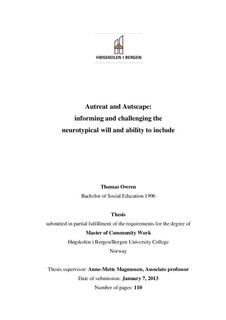| dc.description.abstract | Despite vast research efforts concerning autism, there is insufficient knowledge about what barriers to participation autistic people themselves experience, and how such barriers may be built down. Such knowledge may be crucial to creating an accessible society with equal opportunity to access for example public spaces, work and school environments. This study provides insight into physical and social conditions at two conference events where autistic people are in majority, in charge, and conditions are adapted to their needs and preferences. Using a qualitative approach and relevant sociological theory, I have analyzed the content of openly available online text material written by conference organizers and participants. The study design privileged the voices of autistic people. Findings highlight three vital elements in creating the accessible conditions at these conferences: Firstly, accommodating sensory issues through general adaptations plus enabling individual self-regulation. Secondly, facilitating an autistic style sociality by establishing autistic social rules. Thirdly, protecting the boundaries of the space itself. For community workers, the findings about how these conditions are created may be a knowledge resource both in relation to helping develop other autistic spaces and to avoid colonialist practices. Findings cannot be generalized to the whole autistic population, but point beyond the conference events in question. Based on how conference conditions are created, the study casts doubt on the will and ability of a non-autistic majority to provide full and effective participation for an autistic minority. Still, treating these conferences as examples of "best practices" suggests some ways of enhancing accessibility. More research is needed about how many autistic people experience the kind of barriers to participation counteracted by adaptations at these conferences, and how such barriers may be built down in mainstream society. | en_US |
